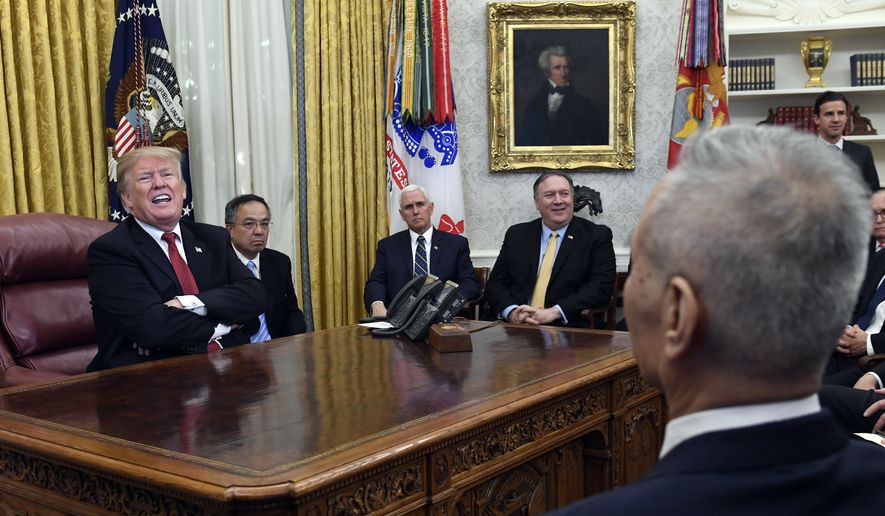Top Chinese officials told President Trump on Thursday that Beijing will buy 5 million tons of soybeans per day from the U.S., a massive order that Mr. Trump said was “a fantastic sign of faith” in intense negotiations to forge a comprehensive trade deal by a March 1 deadline.
“That’s going to make our farmers very happy,” Mr. Trump told Chinese Vice Premier Liu He during an Oval Office meeting with both countries’ trade delegations. “It’s a very big order.”
The two sides wrapped up two days of trade talks in Washington without a comprehensive deal, and U.S. Trade Representative Robert E. Lighthizer said there is “much work to do” before U.S. tariffs are scheduled to rise on about $200 billion worth of Chinese imports March 1.
“I think we made progress,” Mr. Lighthizer said. “At this point, it’s impossible for me to predict success.”
Mr. Trump said he plans to meet with Chinese President Xi Jinping in late February, with the hope of concluding an agreement.
“I think it has a very good chance of happening,” Mr. Trump said. “We’ve made tremendous progress.”
Mr. Xi reportedly has invited the president to meet him on the Chinese resort island of Hainan, around the same time that Mr. Trump is scheduled to hold a second denuclearization summit with North Korean leader Kim Jong-un.
In a letter to Mr. Trump, the Chinese president said relations between the two countries “are at a critically important stage.” He said he wants both nations to “meet each other halfway to reach an early agreement.”
“Such an agreement will send a positive signal to our two peoples and the broader international community,” the Chinese president wrote.
Mr. Xi reminded Mr. Trump that in their last phone call, “you said you wanted China to buy more agricultural products.”
“I have made some arrangements,” Mr. Xi wrote, referring to the soybean order.
U.S. soybean exports to China had dropped by more than 90 percent in the fall as the trade war escalated with retaliatory tariffs from both sides. In 2017, 87 percent of China’s soybeans were imported, mostly from the U.S. and Brazil.
As U.S. soybean farmers lost a major market, the administration created a $12 billion government bailout fund to help them get through the crisis.
After Mr. Trump’s meeting with the Chinese negotiators, the White House issued a statement declaring that March 1 is a “hard deadline” for raising tariffs on China. The Chinese economy has been slumping, and Mr. Trump has said repeatedly that Beijing is eager to make a deal.
The White House said among the issues discussed this week are the ways in which U.S. companies are pressured to transfer technology to Chinese companies, the need for stronger protection and enforcement of intellectual property rights in China, tariff and nontariff barriers faced by U.S. companies in China, China’s cybertheft of U.S. commercial property, “market-distorting forces, including subsidies and state-owned enterprises, [that] can lead to excess capacity, ” removing market barriers and tariffs that limit sales of U.S. products and services in China, and the role of currencies in the U.S.-China trading relationship. They also discussed the U.S. trade deficit with China that hit $335 billion in 2017.
“While progress has been made, much work remains to be done,” the statement said.
Mr. Trump and Mr. Xi declared a 90-day truce on tariff increases in December; U.S. tariffs on Chinese goods are set to rise from 10 percent to 25 percent on March 1.
U.S. financial markets have been in turmoil since September, largely because of investors’ concerns about the escalating tariff war between Washington and Beijing and increases in interest rates by the Federal Reserve. So far in 2019, stocks have bounced back.
Before his meeting with the Chinese officials, Mr. Trump said he might be willing to slightly extend the deadline for talks.
“I think we can do it by March 1. Can you get it down on paper by March 1? I don’t know,” Mr. Trump said. “This isn’t going to be a small deal with China. This is either going to be a big deal or it’s going to be a deal that we’ll just postpone for a while.”
• Dave Boyer can be reached at dboyer@washingtontimes.com.




Please read our comment policy before commenting.